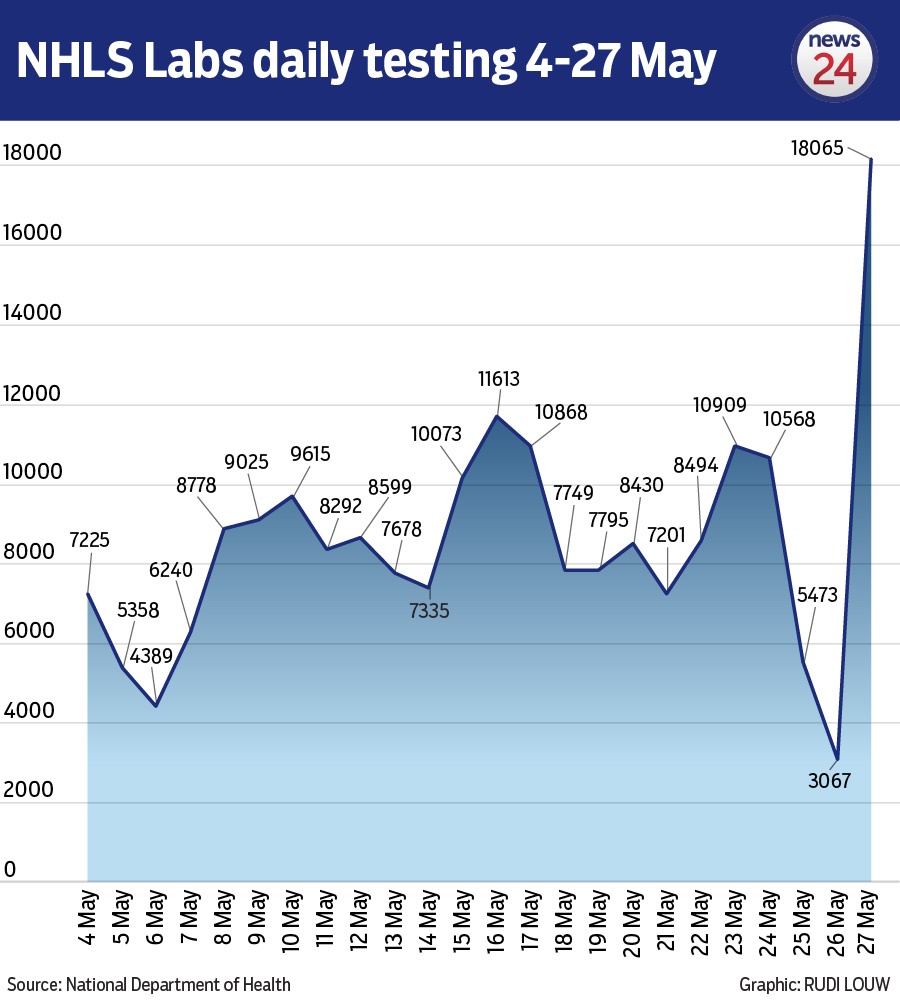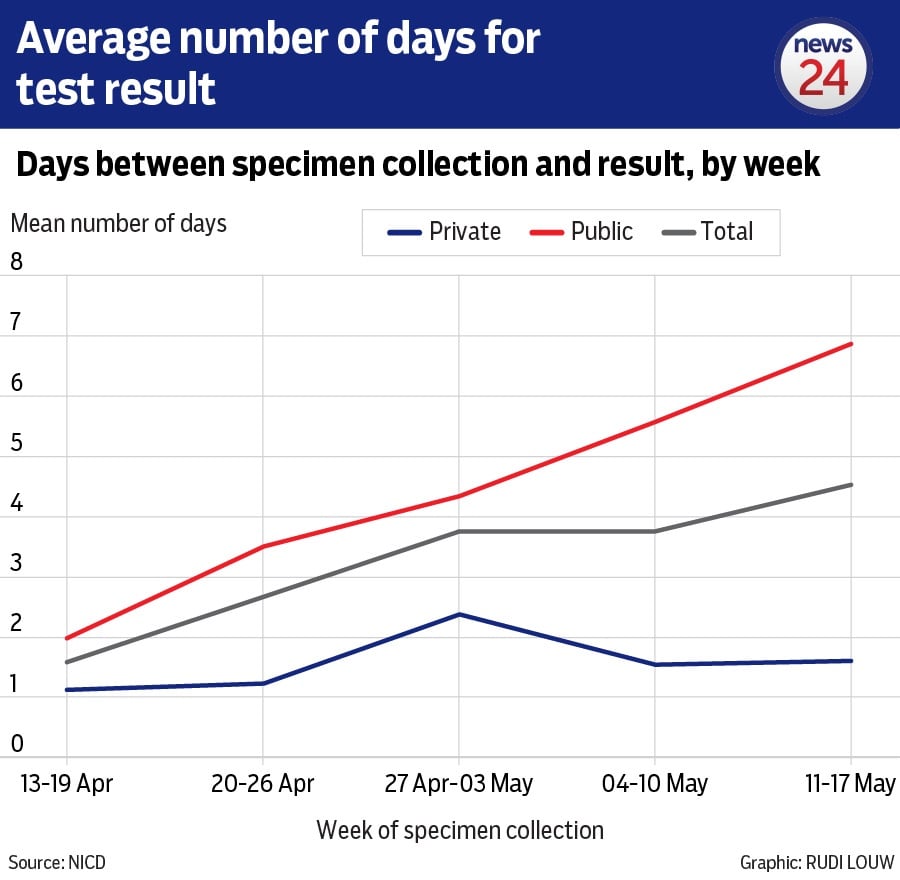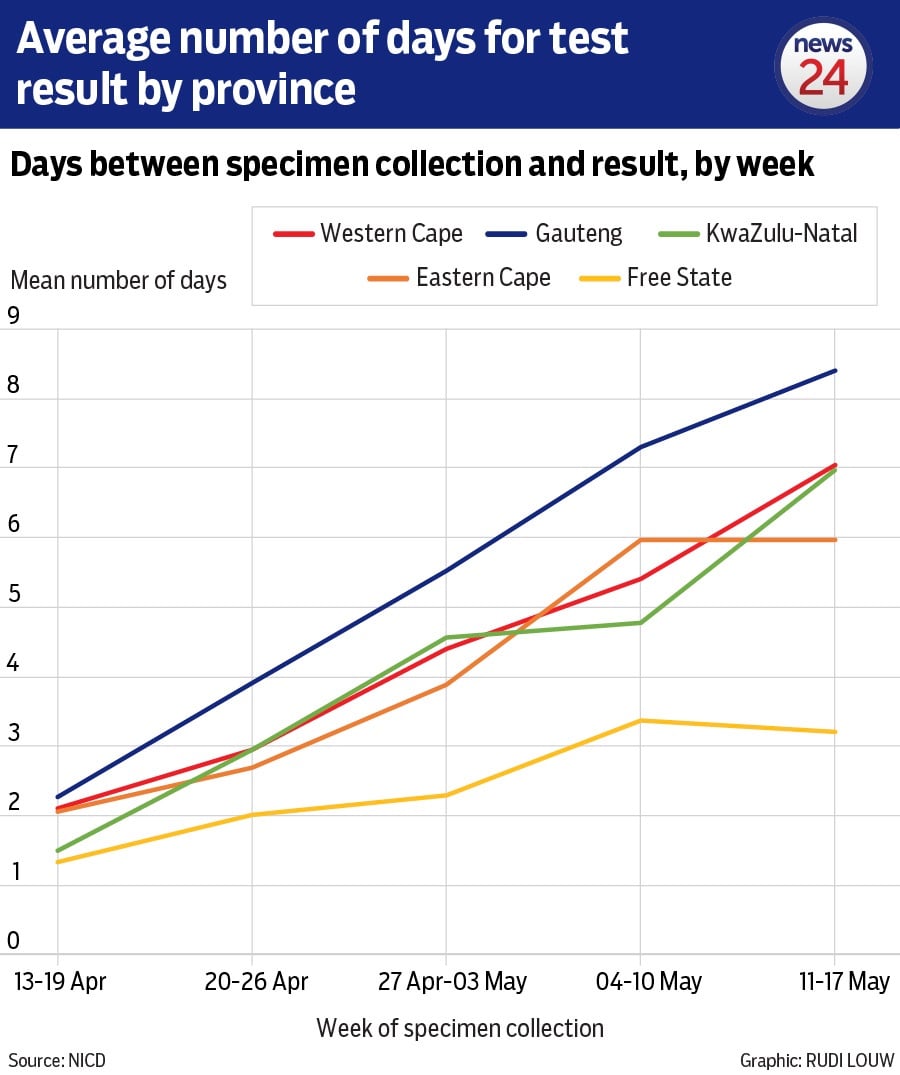How behind is SA on Covid-19 testing? It depends on who you ask, but do not ask government
by Kyle CowanSouth Africa is anywhere between three and 10 days behind on testing, depending on whether you ask Health Minister Zweli Mkhize or his acting director-general, Dr Anban Pillay.
And if you ask the National Health Laboratory Service (NHLS) for data to analyse testing - it simply will not give it to you.
It is clear, however, that state-run laboratories are struggling with a backlog of coronavirus tests.
According to Pillay, they were roughly 10 days, or 80 000 tests, behind.
But according to Mkhize, the actual backlog was 30 000, which would mean public labs were three-and-a-half days behind.
The average incubation period (days between infection and the start of symptoms) for Covid-19 was five days, according to the World Health Organisation.
Mkhize and Pillay were speaking during a joint sitting of the health portfolio committees of the National Council of Provinces and the National Assembly on Thursday night. Mkhize contradicted Pillay minutes after he spoke.
The Department of Health and the CEO of the NHLS, Dr Kamy Chetty, were asked to clarify the mix-up on Thursday night, but no response had been forthcoming at the time of writing.
Earlier on Thursday, Western Cape Premier Alan Winde claimed the national testing backlog stood at 100 000. Late on Thursday night, responding to a Tweet, Winde shared a slide from a NHLS presentation, which showed the backlog of tests for each province - the total, as of 25 May, was 96 480.
The resultant backlog, Winde said during a press briefing earlier on Thursday, had resulted in the Western Cape being forced to alter its testing strategy to focus on hospitalised patients due to severe pressure on testing.
The NHLS, which manages government laboratories, has refused to divulge detailed testing data, particularly sample collection and delivery data, amid unexplained spikes and drops in daily testing numbers this week.
Between 4 and 27 May, NHLS labs tested on average, 8 452 samples a day, an average weighted by a massive spike in the reported number of tests released by Mkhize on Wednesday - 18 065, over 3 000 and 5 000 reported on Monday and Tuesday.
A note accompanying the daily testing report published on the National Institute for Communicable Diseases (NICD) website said the dip and spike was down to tests conducted on 25 May, but not reported the following day.

The NICD, a division of the NHLS, is responsible for collating and de-duplicating the data which is then provided to the Department of Health and others daily, by midday.
The NHLS was asked to provide detailed sample collection and delivery data to allow for a comparison with the number of tests reported daily, but instead of the data requested, News24 received a one-page response providing an explanation as to the difficulties with delays in sample collection and deliveries.
The requested sample data is key to understanding the progression of the Covid-19 pandemic for several reasons:
- There is no indication whether the data reported by the national Department of Health is truly the number of tests done in the past 24 hours - which is evidenced by the reporting of 18 065 tests for the previous day on Wednesday, with no clarification from the department that the reported number included tests completed on Monday.
A massive spike in the number of tests conducted at public laboratories reported on Wednesday (18 065 compared with 3 067 reported on Tuesday) amid a confirmed shortage of testing kits and reagents, underpins concerns that the reported testing numbers are not an up-to-date picture of testing in the country.There is no clear communication from the Department of Health, NHLS or NICD over backlogs and delays in testing in particular.There is no clear communication whether test results reported on, for example, Wednesday 27 May, are results on samples taken from patients or community members the previous day, or over a number of days during the preceding week.
Sample collection dates refer to the date a swab is collected from a person. Sample delivery dates refer to the date the sample is received by laboratories. Date of result is the date the test is completed. Reported date is the date of the number of tests being reported by the Department of Health.
An analysis of the delays in test result reporting by the NICD, published in its latest testing summary report, showed than on average, tests took seven days to be completed from the date of sample collection.

The longest delay was seen in Gauteng, according to the NICD report.

The latest testing analysis report published by the NICD last week shows that on average, it takes six days between the date of sample collection and a result. But it does not analyse how many days it then takes for that result to be reported.
The public must instead rely only on statements by the Department of Health that results are reported within 24 hours.
The NHLS, in response to the request for the data, would only say that sample collection and delivery data are variable for each district and each testing site, dependent on multiple factors including:
- The number of people tested - if there are many people for testing, there will be a longer time period between the first and last specimen being tested.
- The geographical location of testing - if the testing site is far removed from the laboratory, there may be delays in getting samples to the lab for testing.
- Time specimen was taken - swabs taken late in the day may only be processed in an evening laboratory testing run.
- Data is de-duplicated, as one person could be tested several times.
The NICD uses sample collection data to map the number of tests conducted in its testing reports, and sample delivery data in cases where collection data was not available - but made no comparative analysis with the date the number of tests reported.
On 19 May, shortly after it published this testing analysis report for the first time, News24 requested access to underlying sample data.
This request was referred to the NHLS on the same day. On 25 May, the request was repeated as no feedback had been received. On Tuesday, News24 reminded the NHLS of the request.
On Thursday, it responded with a one-page document setting out the reasons why some samples would see delays before being reported.
Responding to queries from News24 on Wednesday, the NHLS said it was continuing to experience challenges with the supply of test kits and reagents due to factors "beyond the NHLS' control".
"As a result of the global shortage of extraction test kits, the supply of stock is sporadic for some of the key products.
"The NHLS has placed orders with the suppliers to meet our testing capacity of 36 000 tests per day; however, we are only receiving limited quantities when the suppliers have them available," it said.
South Africa manufactures no test kits locally and relies on international companies such as Roche in Switzerland and Cepheid in the US for test kits for automated machines manufactured by the same companies, which can conduct tests faster and more efficiently than older equipment.